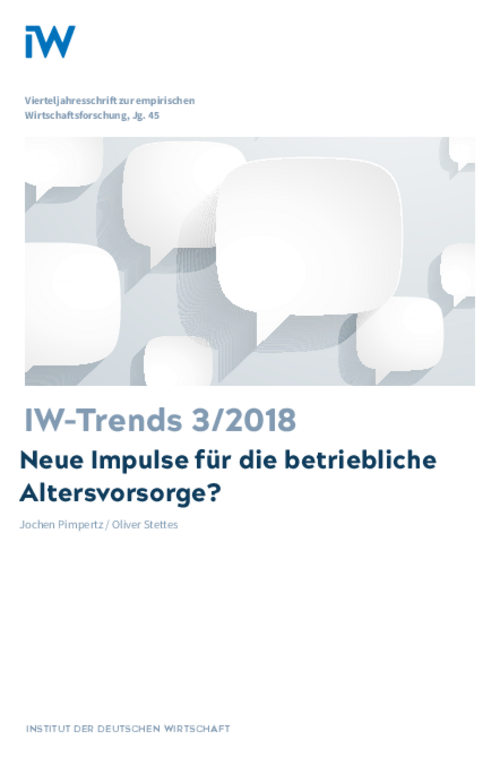Three out of four companies in Germany rely on “direct insurance”, a product offered by an external life assurer, to provide occupational pensions for their employees. Independent “pension funds” and “support funds” have been established in 28 and 18 per cent of firms respectively. Every eighth company operates a “direct commitment” system, disbursing pensions from their own accruals.

An Assessment of the Status Quo on the Introduction of the Strengthening Occupational Pensions Act: A New Boost for Occupational Pensions?
IW-Trends

Three out of four companies in Germany rely on “direct insurance”, a product offered by an external life assurer, to provide occupational pensions for their employees. Independent “pension funds” and “support funds” have been established in 28 and 18 per cent of firms respectively. Every eighth company operates a “direct commitment” system, disbursing pensions from their own accruals.
“Pension funds" that are commissioned by both social partners are to be found in just over 10 per cent of companies. These are the findings of an empirical analysis based on the IW Personnel Panel 2017. The relative proportions of these different ways of providing occupational pensions have not changed significantly since an earlier survey conducted in 2013, nor has how much companies contribute to the financing of occupational pensions. Seven out of ten companies pay at least part of the contributions. Supplementing the established surveys of institutions for occupational retirement provision or employees and retiree s, the direct survey of HR managers also gives an insight into their expectations regarding the newly introduced options for occupational pensions. So far, however, the majority of companies are barely aware of the effects of the new legislation. The extent to which employers are informed increases with the number of their employees. This finding casts doubt on the legislators' hope that the measures enacted in the Strengthening Occupational Pensions Act will motivate especially small and medium-sized enterprises to increase their involvement in occupational pension schemes.

Jochen Pimpertz / Oliver Stettes: Neue Impulse für die betriebliche Altersvorsorge? Status-quo-Messung zur Einführung des Betriebsrentenstärkungsgesetzes
IW-Trends

More on the topic

The Political Economy of Pension Reform
As the German population ages, the country’s statutory pension scheme, which is financed on a pay-as-you-go basis, requires higher and higher contributions while the level of pensions is falling.
IW
Expenditures and Revenues in Germany’s Statutory Health Insurance
Almost annually recurring deficits in Germany’s statutory health insurance system have led to a steady rise in the contribution rate, a percentage of earned income.
IW